Choosing the Best Home Medical Alert System of 2024: A Comprehensive Guide
A medical alert system is a device that allows individuals, particularly the elderly or those with serious medical conditions, to get help during an emergency. These systems, also known as Personal Emergency Response Systems (PERS), provide a quick and easy way for the person in distress to contact emergency services.
Brio House is an independent review site. We may earn money when you click links inside our site.
A medical alert system is a device that allows individuals, particularly the elderly or those with serious medical conditions, to get help during an emergency. These systems, also known as Personal Emergency Response Systems (PERS), provide a quick and easy way for the person in distress to contact emergency services.
The system typically consists of a home base unit and a wearable device, such as a pendant or wristband, with a help button. When the button is pressed, the system connects to a monitoring center, where trained operators respond to the call, assess the situation, and dispatch emergency services if needed.
Importance of Medical Alert Systems
Medical alert systems play a crucial role in ensuring the safety and independence of individuals who may be at risk of falls or medical emergencies at home. They provide peace of mind to both the users and their loved ones, knowing that help is just a button press away.
For seniors living alone, a medical alert system can be a lifeline, allowing them to maintain their independence while ensuring they can get help quickly in an emergency. For people with serious medical conditions, these systems can provide critical, timely assistance, potentially saving lives.
How Do Medical Alert Systems Work?
When the help button on a medical alert device is pressed, the device communicates with the base unit, which then connects to a monitoring center. The monitoring center is staffed 24/7 by trained operators who can talk to the user through a two-way speaker in the base unit.
The operator will assess the situation and, if necessary, contact emergency services or a designated contact person. Some systems also feature automatic fall detection, which can automatically send an alert to the monitoring center if a fall is detected.
Types of Medical Alert Systems: Home and Mobile Systems
There are two main types of medical alert systems: home systems and mobile systems.
Home medical alert systems are designed to work in the user’s home. They consist of a base unit that is connected to a phone line or a cellular network, and a wearable device with a help button.
Mobile medical alert systems, on the other hand, work anywhere there is cellular coverage. They usually come in the form of a wearable device with built-in two-way communication and GPS tracking capabilities. This allows the user to call for help and be located in case of an emergency, even when they are away from home.
The Need for the Right Medical Alert System
Choosing the right medical alert system is crucial as it can significantly impact the user’s safety and quality of life. The right system should be tailored to the user’s specific needs and lifestyle.
For instance, a user who spends a lot of time outside the home might benefit from a mobile medical alert system with GPS tracking. On the other hand, a user with a high risk of falls might need a system with automatic fall detection.
When choosing a system, it’s also important to consider factors such as the reliability of the monitoring center, the cost of the service, the quality of customer service, and the reviews and ratings from other medical alert system users.

Features of a Good Medical Alert System
Automatic Fall Detection
One of the key features to look for in a medical alert system is automatic fall detection. Falls are a common risk for seniors and can lead to serious injuries. Automatic fall detection uses advanced sensors to detect falls and automatically send an alert to the monitoring center, even if the user is unable to press the help button. This feature can be a lifesaver in situations where the user is unconscious or unable to move after a fall.
GPS Tracking and Location Tracking
GPS tracking and location tracking are essential features for mobile medical alert systems. These features allow the monitoring center to locate the user in case of an emergency, which is particularly useful when the user is away from home or unable to communicate their location. GPS tracking can also be useful for caregivers who want to keep track of a loved one’s whereabouts.
Medication Reminders
Medication reminders are a useful feature for users who take medication regularly. The medical alert system can be programmed to remind the user to take their medication at the prescribed times. This feature can help prevent missed doses and ensure that the user is taking their medication as directed.
Battery Life and Equipment Fees
When choosing a medical alert system, it’s important to consider the battery life of the wearable devices. A device with a long battery life will require less frequent charging, which can be more convenient for the user.
Equipment fees are another important consideration. Some medical alert companies charge a one-time equipment fee, while others include the equipment cost in the monthly fee. It’s important to understand these costs upfront to avoid any surprises later.
Cellular Network and Cellular Service
Most mobile medical alert systems operate on a cellular network. This means that they can work anywhere there is cellular coverage, allowing the user to call for help from anywhere.
However, the reliability of the system depends on the quality of the cellular service in the user’s area. It’s important to choose a system that uses a reliable cellular network to ensure that the system will work when it’s needed most.
Some medical alert systems also offer a cellular connection for the home base unit, which can be a good option for users who don’t have a landline.

Who should get a medical alert system?
Medical alert systems can be beneficial for anyone who is at risk of falls or other emergencies, particularly seniors and people with medical conditions or disabilities. They can also provide peace of mind for caregivers and family members.
What are the Best Home Medical Alert System in 2024?
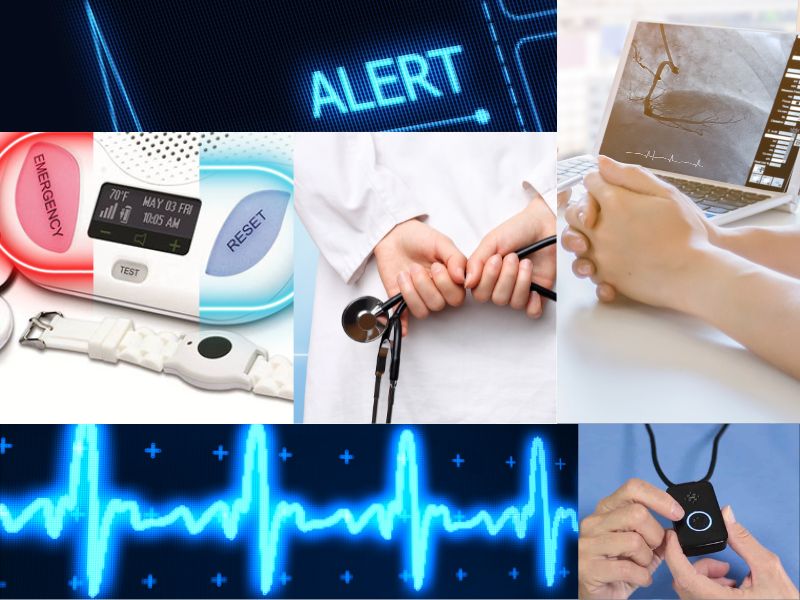
Reviews: The Best Home Medical Alert System in 2024
1. Bay Alarm Medical
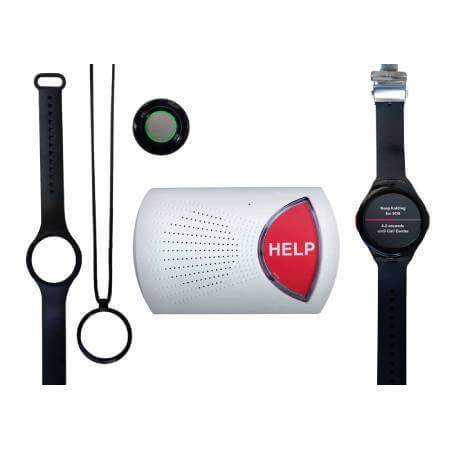
Bay Alarm Medical
Our Rating:

5.0
Bay Alarm Medical is one of the leading providers of medical alert systems. Known for its high-quality devices and excellent customer service, Bay Alarm Medical offers a range of systems to suit different needs and lifestyles. Read our full Bay Alarm Medical Review.
- In-home systems: These operate over a cellular network or a landline and include a base unit and a wearable help button.
- Mobile systems: These include a portable device with built-in two-way communication and GPS tracking.
In-depth Review of Bay Alarm Medical
Bay Alarm Medical is a reputable provider of medical alert systems that offers a variety of systems to cater to different needs. They offer in-home systems, mobile systems, and in-car systems, providing comprehensive coverage for users whether they are at home or on the go.
One of the standout features of Bay Alarm Medical is its automatic fall detection technology, which can be added to any of their systems. This feature uses advanced sensors to detect falls and automatically send an alert to the monitoring center, even if the user is unable to press the help button.
Bay Alarm Medical also offers a caregiver tracking app, which allows caregivers to monitor the user’s location and receive alerts in case of an emergency. This feature can provide peace of mind for caregivers and ensure that help is always within reach for the user.
2. Medical Guardian
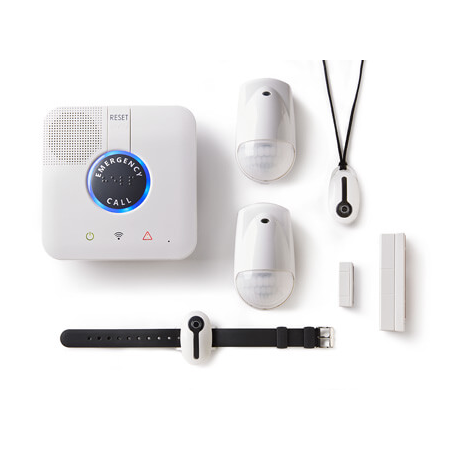
Medical Guardian
Our Rating:

4.8
Medical Guardian is another top-rated medical alert company. They offer a variety of systems, including in-home systems, mobile systems, and a smartwatch medical alert system.
Their devices come with a range of features, including GPS tracking, automatic fall detection, and medication reminders. The mobile devices have a long battery life and operate over a cellular network, allowing the user to call for help from anywhere.
Medical Guardian is known for its flexible pricing plans and no long-term contracts, making it a popular choice for many medical alert system users.
In-depth Review of Medical Guardian
Medical Guardian is a leading provider of medical alert systems that offers a range of systems to suit different lifestyles and needs. They offer in-home systems, mobile systems, and a smartwatch medical alert system.
Their devices come with a range of features, including GPS tracking, automatic fall detection, and medication reminders. The mobile devices have a long battery life and operate over a cellular network, allowing the user to call for help from anywhere.
Medical Guardian is known for its flexible pricing plans and no long-term contracts, making it a popular choice for many medical alert system users.
3. Life Alert
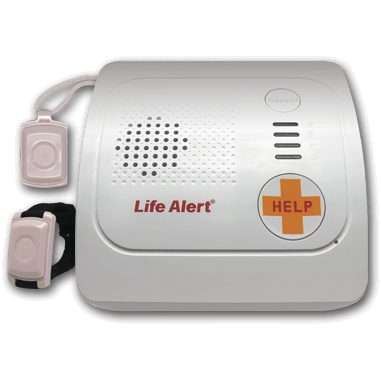
Life Alert
Our Rating:

4.7
Life Alert is a well-known name in the medical alert industry. Their systems are designed to provide round-the-clock protection, both at home and on the go.
Life Alert offers a range of devices, including a home system, a mobile system, and a waterproof pendant that can be worn in the shower. Their systems are connected to a monitoring center that operates 24/7 and can dispatch emergency services when needed.
One of the unique features of Life Alert is their commitment to customer service. They have a large team of trained operators, ensuring that calls for help are answered promptly and professionally.
In-depth Review of Life Alert
Life Alert is a well-known provider of medical alert systems that offers round-the-clock protection for users. They offer a range of devices, including a home system, a mobile system, and a waterproof pendant that can be worn in the shower.
Their systems are connected to a monitoring center that operates 24/7 and can dispatch emergency services when needed. One of the unique features of Life Alert is their commitment to customer service. They have a large team of trained operators, ensuring that calls for help are answered promptly and professionally.
4. SOS Mobile

SOS Mobile
Our Rating:

4.7
SOS Mobile is a leading provider of mobile medical alert systems. Their systems are designed for active seniors who want the peace of mind of being able to call for help from anywhere.
Their devices are compact and easy to carry, with a long battery life and a waterproof design. They operate over a cellular network and include GPS tracking and automatic fall detection.
SOS Mobile also offers a caregiver app, which allows caregivers to monitor the user’s location and receive alerts in case of an emergency.
In-depth Review of SOS Mobile
SOS Mobile is a leading provider of mobile medical alert systems. Their systems are designed for active seniors who want the peace of mind of being able to call for help from anywhere.
Their devices are compact and easy to carry, with a long battery life and a waterproof design. They operate over a cellular network and include GPS tracking and automatic fall detection.
SOS Mobile also offers a caregiver app, which allows caregivers to monitor the user’s location and receive alerts in case of an emergency.
Other Notable Medical Alert Systems
There are many other notable medical alert systems, each with their own unique features and benefits. Some of these include:
- MobileHelp: Known for their innovative mobile devices and smartwatch option.
- GreatCall: Offers a mobile system with a range of health and safety services, including a personal operator service.
- QMedic: Offers a smart medical alert system that monitors physical activity and sleep patterns in addition to providing emergency response.
When choosing a medical alert system, it’s important to consider your specific needs and circumstances, as well as the features and costs of the different systems.
Comparison of the Reviewed Systems
When comparing these medical alert systems, it’s clear that each has its own strengths and unique features.
- Bay Alarm Medical stands out for its comprehensive coverage and caregiver tracking app.
- Medical Guardian is notable for its flexible pricing plans and range of features, including medication reminders.
- Life Alert is known for its round-the-clock protection and commitment to customer service.
- SOS Mobile is ideal for active seniors with its compact, easy-to-carry devices and caregiver app.
Choosing the right system depends on the user’s specific needs and lifestyle. It’s important to consider factors such as the type of system (in-home or mobile), the features (such as automatic fall detection and GPS tracking), the cost, and the reputation of the medical alert company.
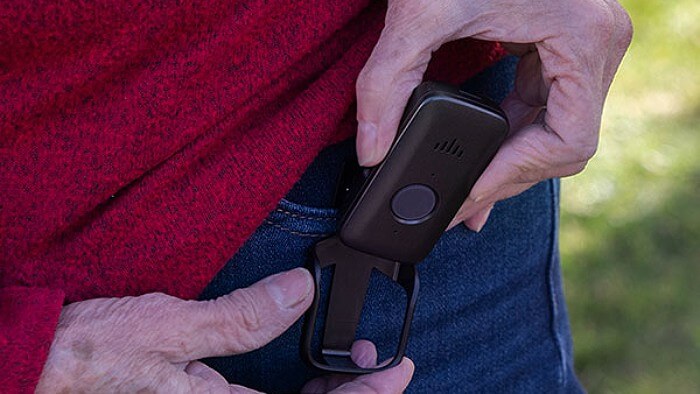
Costs and Affordability of Medical Alert Systems
Understanding Monthly Costs and Activation Fees
The cost of a medical alert system typically includes a monthly fee and possibly an activation fee. The monthly costs usually cover the use of the equipment and the monitoring service. Some companies charge an activation fee to start the service, although many companies waive this fee as part of their promotional offers.
The monthly fee can vary widely depending on the features of the system. For example, systems with advanced features like GPS tracking or automatic fall detection may have a higher monthly fee. It’s also important to note that mobile medical alert systems often have a higher monthly fee than in-home systems due to the additional technology and services they provide.
Price Lock Guarantee and Affordable Medical Alert Systems
Some medical alert companies offer a price lock guarantee. This means that the price you pay when you start the service will remain the same for as long as you keep the service. This can be a significant advantage as it protects you from price increases in the future.
When it comes to affordability, it’s important to consider not just the price but also the value you get from the system. An affordable medical alert system is one that offers the features and services you need at a price you can afford. Some companies offer discounts for annual or semi-annual payments, which can make the system more affordable.
Cost of Home Medical Alert Systems vs Mobile Medical Alert Systems
In general, home medical alert systems are less expensive than mobile medical alert systems. This is because home systems are simpler and require less technology. They typically involve a base unit and a wearable help button, while mobile systems require additional technology to provide coverage outside the home.
However, the cost can vary depending on the features of the system. For example, a home system with automatic fall detection may cost more than a basic mobile system. It’s also worth noting that while mobile systems may have a higher monthly fee, they provide coverage both at home and on the go, which can provide greater peace of mind.
How Much Do Most Medical Alert Systems Cost?
The cost of medical alert systems can vary widely depending on the features and services they offer. On average, you can expect to pay between $20 and $50 per month for a basic in-home system. Mobile systems typically cost between $30 and $60 per month.
In addition to the monthly fee, some companies charge an activation fee or an equipment fee. However, many companies include the equipment in the monthly fee and do not charge an activation fee.
Ways to Save on Medical Alert Systems
There are several ways to save on medical alert systems. Here are a few tips:
- Compare prices: Prices can vary widely between companies, so it’s worth shopping around to find the best deal.
- Look for discounts: Some companies offer discounts for annual or semi-annual payments, AARP members, veterans, or for referring a friend.
- Choose the right system: Don’t pay for features you don’t need. A basic in-home system is usually sufficient for most people.
- Ask about price lock guarantees: Some companies offer a price lock guarantee, which can protect you from future price increases.
Remember, the most important thing is to choose a system that meets your needs and provides peace of mind. The cost is secondary to the safety and independence that a good medical alert system can provide.
User Experience and Reviews
Feedback from Medical Alert System Users
Feedback from medical alert system users is a valuable resource when evaluating different systems. Users can provide firsthand information about the system’s performance, ease of use, and the quality of the customer service.
Common feedback from users often includes comments on the system’s reliability, the responsiveness of the monitoring center, and the comfort and convenience of the wearable devices. Users may also comment on the system’s features, such as the effectiveness of the automatic fall detection or the accuracy of the GPS tracking.
Role of the Reviews Team in Evaluating Systems
The role of a reviews team is crucial in evaluating medical alert systems. These teams conduct thorough testing and analysis of different systems, assessing factors such as performance, reliability, features, and cost.
The reviews team typically tests the systems in real-world conditions to evaluate their performance and reliability. They also analyze the system’s features and compare them to other systems on the market. The team’s findings are then compiled into comprehensive reviews that provide valuable information for consumers.
Common Complaints and Praises
Common complaints about medical alert systems often revolve around issues such as false alarms, difficulties with setup or use, or poor customer service. Some users may also complain about the cost, particularly if there are additional fees that were not clearly disclosed upfront.
On the other hand, common praises often highlight the system’s reliability, the quality of the customer service, and the peace of mind that the system provides. Users may also praise the system’s features, such as automatic fall detection or GPS tracking, particularly if these features have proven to be beneficial in an emergency.
Importance of User Reviews in Choosing a System
User reviews are an important factor to consider when choosing a medical alert system. These reviews provide firsthand information about the system’s performance and reliability, as well as the quality of the customer service.
Reviews can highlight potential issues or drawbacks that may not be apparent from the product description or marketing materials. They can also provide insights into the system’s ease of use, which can be particularly important for seniors or others who may not be comfortable with technology.
Case Studies of User Experiences
Case studies of user experiences can provide valuable insights into the performance and reliability of medical alert systems. These case studies typically involve detailed accounts of users’ experiences with the system, including any emergencies where the system was used.
These case studies can provide a realistic picture of how the system performs in real-world conditions. They can also highlight the system’s strengths and weaknesses, providing valuable information for consumers.
For example, a case study might detail a situation where the automatic fall detection feature successfully detected a fall and alerted the monitoring center, leading to a quick response from emergency services. Alternatively, a case study might highlight issues with the system, such as false alarms or difficulties with setup or use.
User experiences and reviews are a valuable resource when choosing a medical alert system. They provide firsthand information about the system’s performance and reliability, as well as the quality of the customer service. By considering these reviews, consumers can make an informed decision and choose the system that best meets their needs.
Role of Monitoring Centers and Emergency Services

Understanding the Role of Monitoring Centers
The role of monitoring centers in medical alert systems is crucial. These centers are staffed by trained operators who are on call 24/7 to respond to alerts from the system. When an alert is received, the operator will attempt to communicate with the user through the system’s two-way communication feature. If the user is in distress or does not respond, the operator will dispatch emergency services to the user’s location.
Monitoring centers are the heart of any medical alert system. They provide the immediate response that can be critical in an emergency situation. The operators at these centers are trained to handle a variety of situations and to provide reassurance and assistance to the user until help arrives.
Interaction with Emergency Services
When an emergency alert is received, the monitoring center operator will attempt to determine the nature of the emergency and the appropriate response. This may involve communicating with the user, if possible, or using information provided by the user when they signed up for the service.
Once the operator has determined that emergency services are needed, they will dispatch the appropriate services to the user’s location. This could be an ambulance, the police, or the fire department, depending on the nature of the emergency.
The operator will also stay on the line with the user, if possible, until help arrives. They can provide reassurance and potentially lifesaving instructions to the user.
Training and Expertise of Monitoring Center Operators
Monitoring center operators are highly trained professionals. They undergo extensive training to handle a variety of emergency situations and to provide assistance and reassurance to users.
Operators are trained to communicate effectively with users, to assess the nature of the emergency, and to dispatch the appropriate emergency services. They are also trained to provide instructions to the user, such as how to perform CPR, if necessary.
In addition to their initial training, operators often undergo ongoing training to keep their skills and knowledge up to date. This ensures that they are prepared to handle any situation that may arise.
Response Time and Efficiency
The response time of the monitoring center is a critical factor in the effectiveness of a medical alert system. In an emergency, every second counts, and a quick response can make the difference between life and death.
Most medical alert companies strive to have a response time of under a minute from the time an alert is received to the time an operator is on the line with the user. This quick response ensures that help is dispatched as soon as possible and that the user receives assistance and reassurance without delay.
Efficiency is also crucial in a monitoring center. Operators must be able to quickly assess the situation, communicate with the user, and dispatch emergency services. They must also be able to handle multiple alerts at once and to stay calm and focused in high-pressure situations.
Importance of Reliable Monitoring Centers
Reliable monitoring centers are essential to the effectiveness of medical alert systems. These centers provide the immediate response that users rely on in an emergency.
A reliable monitoring center is staffed 24/7 by trained operators who are ready to respond to alerts at any time. The center should have backup systems in place to ensure that they can continue to operate in the event of a power outage or other disruption.
In addition, a reliable monitoring center should have a quick response time and efficient operators. Users should be able to trust that when they press their help button, they will quickly be connected to an operator who can provide assistance and dispatch emergency services if needed.
The role of monitoring centers and emergency services in medical alert systems is crucial. These services provide the immediate response and assistance that users need in an emergency. By understanding the role of these services and the importance of reliability and efficiency, users can make an informed decision when choosing a medical alert system.
Additional Features and Services
Caregiver App and Its Benefits
A caregiver app is a feature offered by some medical alert companies that allows caregivers to monitor the user’s status and receive alerts. This can be particularly beneficial for caregivers who are not always physically present with the user.
The app can provide real-time updates on the user’s status, including alerts for emergencies or if the user has left a designated safe area. Some apps also allow caregivers to check the user’s location using GPS tracking.
The caregiver app provides peace of mind for caregivers, knowing that they can be alerted in case of an emergency and can check on the user’s status at any time.
Standalone Medical Alert Devices
Standalone medical alert devices are devices that can operate independently of a base unit. These devices can be particularly useful for users who are often on the go, as they can provide coverage wherever the user is.
Standalone devices typically have a help button that the user can press to connect with the monitoring center. They may also include features such as GPS tracking and automatic fall detection.
Smartwatch Medical Alert Systems
Smartwatch medical alert systems are a relatively new development in the field of medical alert systems. These systems combine the functionality of a smartwatch with the features of a medical alert system.
Users can wear the smartwatch just like a regular watch, but it also includes a help button to connect with the monitoring center. It may also include features such as GPS tracking, automatic fall detection, and health monitoring features such as heart rate monitoring.
Personal Emergency Response System
A personal emergency response system (PERS) is a type of medical alert system that allows users to call for help in an emergency. The system typically includes a base unit and a wearable device with a help button. When the button is pressed, the system connects the user with a monitoring center.
PERS can provide peace of mind for users and their families, knowing that help is just a button press away. They can be particularly beneficial for seniors or others who are at risk of falls or other emergencies.
On the Go Devices and Their Advantages
On the go devices are medical alert devices that are designed to be portable and to provide coverage wherever the user is. These devices can be particularly beneficial for active seniors or others who often leave their homes.
On the go devices typically operate over a cellular network and include a help button to connect with the monitoring center. They may also include features such as GPS tracking and automatic fall detection.
The main advantage of on the go devices is their portability. Users can carry these devices with them wherever they go, providing peace of mind and protection not just at home, but anywhere.
Making the Right Choice

Factors to Consider When Choosing a Medical Alert System
When choosing a medical alert system, there are several factors to consider:
- Features: Consider the features that are important to you, such as GPS tracking, automatic fall detection, or a caregiver app.
- Cost: Consider the monthly fee, any activation or equipment fees, and whether the company offers a price lock guarantee.
- Reliability: Look for a system with reliable equipment and a reliable monitoring center.
- Reviews: Read reviews from other users and from professional reviews teams to get a sense of the system’s performance and reliability.
- Customer Service: Consider the quality of the customer service, including the response time of the monitoring center and the helpfulness of the customer service representatives.
Understanding Your Needs: At Home System vs On the Go System
Understanding your needs is crucial when choosing a medical alert system. If you spend most of your time at home, an at home system may be sufficient. These systems typically involve a base unit and a wearable help button, and they provide coverage in and around your home.
If you are often out and about, you may want to consider an on the go system. These systems operate over a cellular network and provide coverage wherever you are. They typically include a portable device with a help button, and they may also include features such as GPS tracking.
Evaluating Medical Alert System Providers
When evaluating medical alert system providers, consider factors such as the features and services they offer, their prices, and their reputation. Read reviews from other users and from professional reviews teams to get a sense of the provider’s reliability and customer service.
Also consider the provider’s policies, such as whether they offer a day risk-free trial or a price lock guarantee. These policies can provide additional peace of mind and protection.
Importance of a Day Risk-Free Trial
A day risk-free trial allows you to try out a medical alert system before committing to a long-term contract. This can be particularly beneficial if you are unsure about whether the system will meet your needs.
During the trial period, you can test out the system’s features and performance, and you can also evaluate the quality of the customer service and the response time of the monitoring center. If you are not satisfied with the system for any reason, you can return it for a full refund.
Making the Final Decision
Making the final decision on a medical alert system can be challenging, but by considering your needs and evaluating different systems and providers, you can find the system that is right for you.
Start by considering your lifestyle and needs. If you’re often on the move, a mobile device or a system designed for on-the-go use might be the best fit. If you’re mostly homebound, a home-based system might be more suitable.
Next, consider the features that are most important to you. Do you need a system with fall detection? GPS tracking? A caregiver app? Make a list of your must-have features and use this as a guide when evaluating different systems.
Don’t forget to consider the reputation and reliability of the medical alert system companies. Read reviews, ask for recommendations, and do your research to ensure that the company you choose is reliable and trustworthy.
Also, consider the cost. While it’s important to find a system that fits within your budget, don’t let cost be your only deciding factor. Remember, a medical alert system is an investment in your safety and peace of mind.
Finally, remember that there are many medical alert system options out there, and the best medical alert systems are those that meet your individual needs and circumstances. Don’t be afraid to take your time, do your research, explore other medical alert systems, and make the decision that is right for you.
Frequently Asked Questions:
What is a medical alert system and how does it work?
A medical alert system is a device that allows users to call for help in an emergency. The system typically includes a base unit and a wearable device with a help button. When the button is pressed, the system connects the user with a monitoring center, which can dispatch emergency services if needed.
Who should get a medical alert system?
Medical alert systems can be beneficial for anyone who is at risk of falls or other emergencies, particularly seniors and people with medical conditions or disabilities. They can also provide peace of mind for caregivers and family members.
Why not use a cell phone instead of a medical alert system?
While cell phones can be used to call for help in an emergency, they may not be as reliable or convenient as a medical alert system. For example, a cell phone may not be within reach during an emergency, and it may be difficult to dial a number if you are injured or in distress. In contrast, a medical alert system is typically worn on the body and can be activated with the push of a button.
Why not use a digital voice assistant like Amazon Alexa or Google Home?
While digital voice assistants can provide many useful features, they may not be as reliable or effective as a medical alert system in an emergency. For example, they may not work during a power outage, and they may not be able to hear you if you are far away or unable to speak loudly.
What happens if I press the help button and can’t talk?
If you press the help button and can’t talk, the monitoring center will still receive the alert. The operator will attempt to communicate with you, and if they don’t receive a response, they will dispatch emergency services to your location.
What happens if I fall, and I’m unable to press the help button due to loss of consciousness or injury?
Many medical alert systems include an automatic fall detection feature. This feature can detect a fall and automatically send an alert to the monitoring center, even if you are unable to press the help button.
How do emergency responders know my medical history?
When you sign up for a medical alert system, you can provide information about your medical history and any specific conditions or allergies. This information is stored securely and can be accessed by the monitoring center in an emergency.
Is a medical alert system easy to set-up? Do I need someone to set it up for me?
Most medical alert systems are designed to be easy to set up. They typically involve plugging in a base unit and syncing it with a wearable device. Some companies also offer professional installation services if needed.
Can I get a medical alert system if I don’t have a landline?
Yes, many medical alert systems operate over a cellular network and do not require a landline.
Are medical alert systems water proof? Can I wear it in the shower?
Most wearable medical alert devices are waterproof and can be worn in the shower or bath.
How often do I need to recharge an in-home medical alert system?
The battery life of an in-home medical alert system can vary depending on the model and usage. Some systems have a battery life of several years, while others may need to be recharged every few days.
How do I wear my help button?
The help button can typically be worn as a pendant aroundthe neck, on the wrist like a watch, or clipped to clothing. The choice often depends on personal preference and comfort.
What if my medical alert system no longer works?
If your medical alert system stops working, you should contact the provider immediately. They can troubleshoot the issue and, if necessary, provide a replacement.
How accurate is the fall detection system?
The accuracy of the fall detection system can vary depending on the model and the circumstances of the fall. While no system can detect 100% of falls, many systems can detect the majority of falls.
How much does a medical alert system cost?
The cost of a medical alert system can vary depending on the features and services provided. Most systems involve a monthly fee, which can range from around $20 to over $50.
Are there discounts?
Some medical alert companies offer discounts for annual or semi-annual payments, for veterans, or for other special groups. It’s always worth asking about any available discounts.
Are medical alert systems covered by Medicare, Medicaid or insurance?
Coverage for medical alert systems varies. Some Medicare Advantage plans may cover the cost, but Original Medicare does not. Some private insurance companies may offer coverage, and some state Medicaid programs may cover the cost for qualifying individuals.
Can I try the system before I subscribe?
Many medical alert companies offer a day risk-free trial period during which you can try the system and return it for a full refund if you are not satisfied.
Do I have to commit to a long term contract?
Contract requirements vary by company. Some medical alert companies offer month-to-month services, while others may require a longer commitment.
Can my monthly fees increase after I’ve subscribed?
Some medical alert companies offer a price lock guarantee, which ensures that your monthly fees will not increase for as long as you are a subscriber.
Conclusion: Choosing the Best Home Medical Alert System
Selecting the best medical alert system is a decision that should be made with careful consideration. It’s not just about picking the system with the most features or the lowest price, but rather choosing a system that aligns with your specific needs and lifestyle.
If you’re frequently on the move, a go medical alert system or a mobile medical alert device might be the best fit for you. These systems are designed to work outside the home and often come equipped with GPS tracking and optional fall detection features. They provide coverage wherever you are, ensuring that help is always just a button press away.
On the other hand, if you spend most of your time at home, a monitored medical alert system might be more suitable. These systems typically include a base unit and a wearable medical alert device, such as a pendant or wristband, that you can press to call for help.
Consider also the type of device that would work best for you. Some people prefer a standalone medical alert device, which can operate independently of a base unit. Others might prefer a system that integrates with their existing devices, such as a smartphone or smartwatch.
Fall detection is another important feature to consider. A fall detection device can automatically alert the monitoring center if it detects a fall, which can be particularly beneficial if you are at risk of falls or if you live alone.
Remember, a medical alert system is more than just a device; it’s a service that can provide invaluable peace of mind. It’s about knowing that in the event of a medical emergency, help is just a button press away.
When choosing a system, consider not just the device itself, but also the service provided by the medical alert system companies. Look for a company with a good reputation, reliable customer service, and a responsive monitoring center.
Finally, remember that most medical alert systems require a monthly subscription, and some may also require an equipment fee. Be sure to consider these costs when choosing a system, and look for a company that offers a transparent pricing structure with no hidden fees.
In conclusion, the best medical alert system is the one that provides the features you need, fits within your budget, and gives you peace of mind. By considering your needs and doing your research, you can find the system that is right for you.

